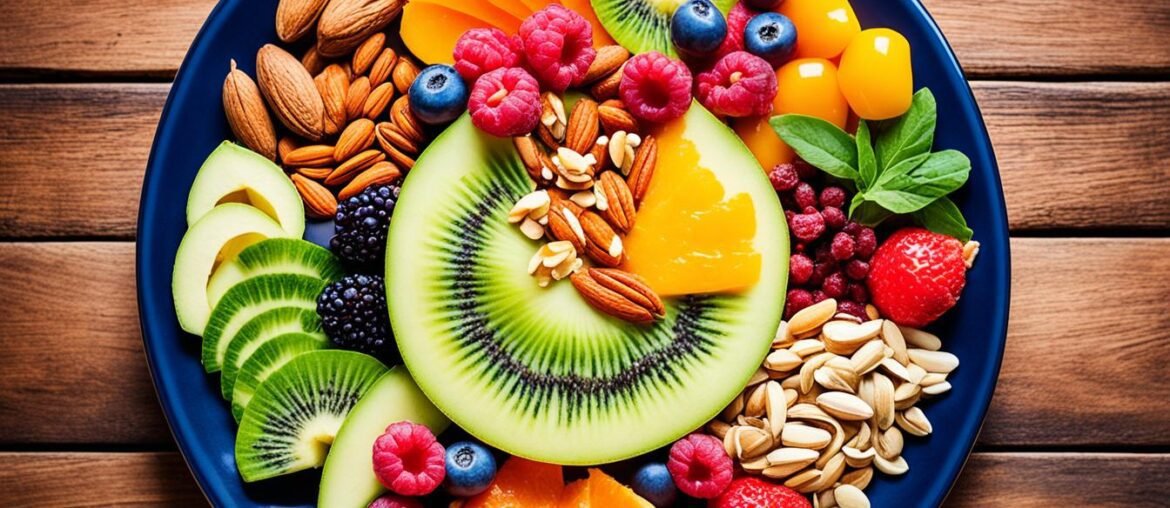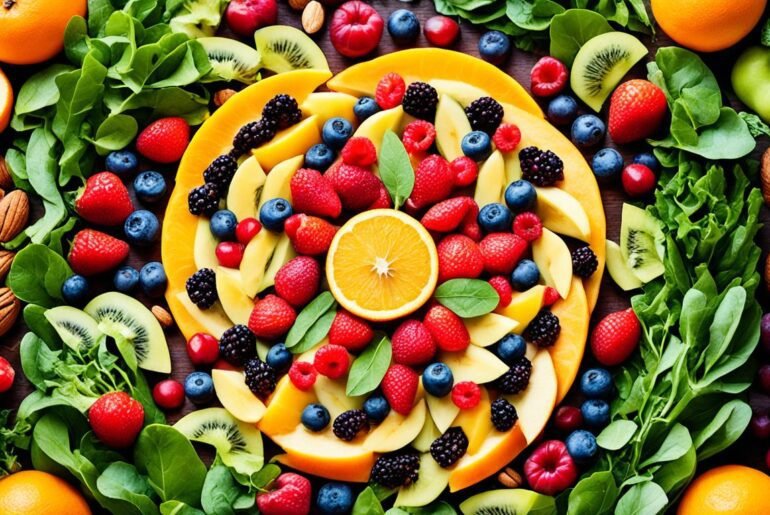Did you know that what you eat can have a profound impact on the health and appearance of your skin? It’s true! The food choices you make can either support or detract from your skin’s natural beauty and resilience. In fact, research has shown that certain foods can help slow down the aging process and rejuvenate your skin from the inside out.
Discover the power of an anti-aging diet and how it can transform your skin. From nourishing vegetables and skin-friendly fruits to the role of nuts and seeds in skin care, we’ll explore the best foods for youthful skin. We’ll also delve into the impact of carbs, sugar, sun exposure, and collagen on skin aging.
Key Takeaways:
- An anti-aging diet can support the health and appearance of your skin.
- Incorporate vegetables, fruits, nuts, and seeds into your diet for skin rejuvenation.
- Avoid excessive sugar consumption to prevent collagen damage and premature aging.
- Protect your skin from the sun’s harmful UV rays to maintain a youthful complexion.
- Collagen plays a crucial role in skin health, so prioritize foods that support collagen production.
The Power of Vegetables for Youthful Skin
When it comes to achieving youthful and radiant skin, a diet rich in vegetables can work wonders. Vegetables are not only packed with essential nutrients, but they also contain antioxidants that help protect the skin from oxidative stress and promote its overall health.
There are several vegetables that are particularly beneficial for maintaining youthful-looking skin:
- Broccoli: This cruciferous vegetable is a powerhouse of vitamins C and E, both of which are known to promote collagen production and protect the skin from damaging free radicals.
- Red bell peppers: Loaded with vitamin C, red bell peppers can aid in the production of collagen, improve skin texture, and protect against sun damage.
- Spinach: Packed with iron and vitamin K, spinach helps improve blood circulation, reducing the appearance of dark circles and giving your skin a healthy glow.
- Sweet potatoes: These vibrant root vegetables are rich in beta-carotene, which gets converted into vitamin A in the body. Vitamin A promotes cell turnover and helps maintain smooth and supple skin.
- Watercress: Known for its detoxifying properties, watercress is a leafy green vegetable that is abundant in vitamins A and C. These vitamins help reduce inflammation and boost collagen production, resulting in youthful and glowing skin.
Incorporating these vegetables into your daily diet can provide your skin with the necessary nutrients to maintain its health and vitality. To get started, try adding them to salads, stir-fries, or smoothies for a delicious and skin-rejuvenating boost.
Key Nutrients in Skin-Rejuvenating Vegetables
| Vegetable | Nutrients |
|---|---|
| Broccoli | Vitamins C and E |
| Red bell peppers | Vitamin C |
| Spinach | Iron, Vitamin K |
| Sweet potatoes | Beta-carotene, Vitamin A |
| Watercress | Vitamins A and C |
Fruits for Radiant Skin
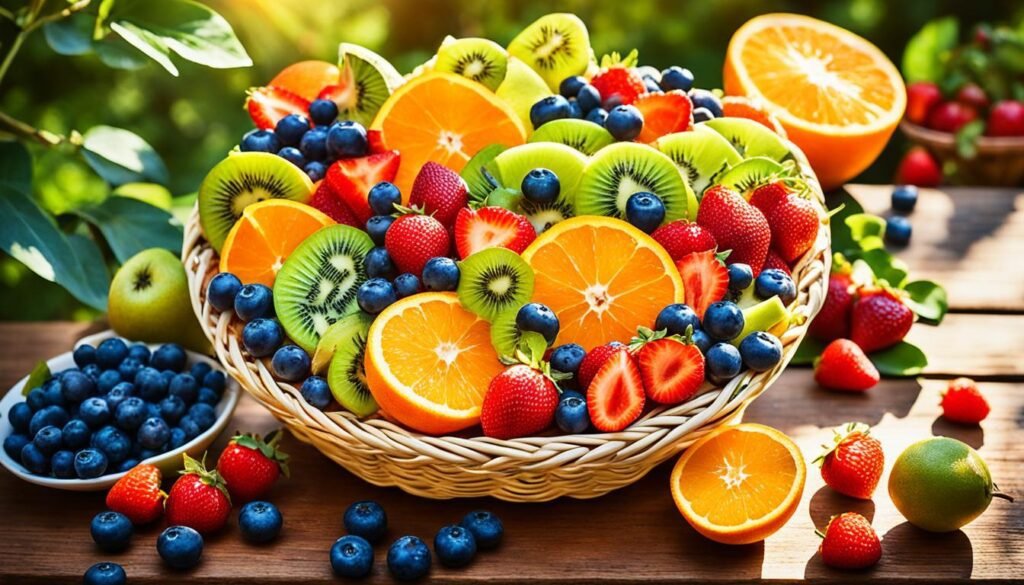
When it comes to achieving radiant skin, incorporating the right fruits into your diet can have a significant impact. Fruits such as avocado, blueberries, and papaya are not only delicious but also packed with antioxidants, vitamins, and minerals that can benefit your overall health and promote skin health.
Avocado: This creamy fruit is rich in healthy monounsaturated fats, which help to moisturize and nourish the skin. It is also loaded with vitamin E, which acts as an antioxidant and protects against skin damage caused by free radicals.
“A diet rich in avocado can help improve skin elasticity and reduce the appearance of fine lines and wrinkles.”
Blueberries: These small berries are a powerhouse of antioxidants, including vitamins C and E, as well as anthocyanins. These antioxidants help to neutralize free radicals and promote collagen production, resulting in firmer and younger-looking skin.
“Including blueberries in your diet can help fight signs of aging and improve skin tone and texture.”
Papaya: This tropical fruit is not only delicious but also beneficial for your skin. Papaya contains an enzyme called papain, which helps to exfoliate and remove dead skin cells, revealing a fresh and glowing complexion. It is also rich in vitamin C, which aids in collagen production and brightens the skin.
“Eating papaya regularly can help reduce the appearance of dark spots, blemishes, and acne scars, giving you a smoother and more even skin tone.”
Incorporating these fruits into your diet can provide your skin with essential nutrients that promote a radiant complexion and reduce the signs of aging. Whether enjoyed on their own, added to smoothies, or used as toppings for salads or yogurt, these fruits are a delicious and skin-friendly addition to any meal plan.
The Role of Nuts and Seeds in Skin Care
When it comes to achieving healthy, youthful-looking skin, incorporating nuts and seeds into your diet can be a game-changer. These tiny powerhouses are packed with essential nutrients, healthy fats, and antioxidants that provide numerous benefits for your skin.
Nuts, such as almonds and walnuts, are particularly beneficial for skin health. Almonds are a great source of vitamin E, a powerful antioxidant that helps repair skin tissue and protect against UV damage. Additionally, the healthy fats found in almonds can help retain moisture in the skin, keeping it hydrated and supple.
“Almonds are rich in vitamin E, which is essential for skin health. Including almonds in your diet can help nourish your skin from the inside out.”
Similarly, walnuts are also rich in vitamin E and provide a good source of omega-3 fatty acids, which have anti-inflammatory properties that can soothe and calm irritated skin. These nutrients promote healthy skin cell turnover and contribute to a more youthful complexion.
In addition to nuts, seeds like pomegranate seeds are excellent for skin health. Pomegranate seeds are packed with antioxidants, which help protect the skin from free radicals and prevent premature aging. They also contain ellagic acid, a compound known to lighten dark spots and improve overall skin tone.
With their high antioxidant content and nourishing properties, these nuts and seeds are truly the best allies for skin care.
The Anti-Aging Power of Nuts and Seeds:
| Nut/Seed | Benefits |
|---|---|
| Almonds | Rich in vitamin E and healthy fats, repairs skin tissue, retains moisture, and protects against UV damage. |
| Walnuts | High in vitamin E and omega-3 fatty acids, promotes healthy cell turnover, reduces inflammation, and soothes irritated skin. |
| Pomegranate Seeds | Loaded with antioxidants and ellagic acid, protects against free radicals, lightens dark spots, and improves skin tone. |
The Importance of Power Carbs for Skin Health
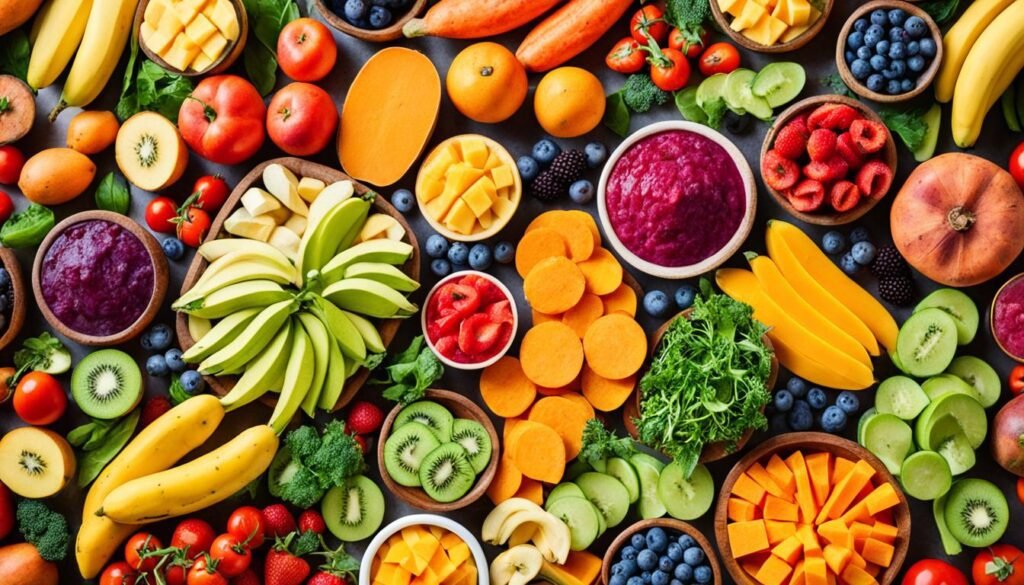
When it comes to maintaining healthy and youthful-looking skin, your diet plays a crucial role. While we often associate carbs with weight gain or energy crashes, there are actually certain types of carbohydrates that can do wonders for your skin. Introducing power carbs – the skin-friendly carbohydrates that provide a range of benefits for your skin health.
Power carbs, such as whole grains, beans, and lentils, are rich in fiber, antioxidants, and protein, making them an excellent addition to your skincare routine. These carbohydrates not only provide sustained energy but also offer essential nutrients that can help nourish your skin from within.
One of the key benefits of power carbs is their ability to stabilize blood sugar levels. Fluctuations in blood sugar can lead to collagen damage and the breakdown of elastin, resulting in premature aging and skin sagging. By incorporating power carbs into your diet, you can maintain stable blood sugar levels and promote healthier, more resilient skin.
The Benefits of Power Carbs for Skin Health
1. Protecting Collagen: Collagen is the protein responsible for maintaining skin’s elasticity and firmness. Power carbs, with their antioxidant properties, help protect collagen from damage caused by free radicals and environmental stressors.
2. Promoting Skin Cell Renewal: Power carbs are also great sources of B vitamins, which play a crucial role in skin cell regeneration. These vitamins help repair and renew skin cells, leading to a brighter, more youthful complexion.
3. Enhancing Skin Hydration: Keeping your skin well-hydrated is essential for a healthy, glowing complexion. Power carbs, especially whole grains, contain complex carbohydrates that help lock in moisture, promoting optimal skin hydration.
“Incorporating power carbs into your diet can boost your skin’s natural radiance and promote long-term skin health.” – Dr. Emily Johnson, Dermatologist
4. Supporting Antioxidant Defense: Power carbs are packed with antioxidants, which help combat oxidative stress and protect your skin from the damaging effects of free radicals. Antioxidants are essential for maintaining a youthful appearance and preventing premature signs of aging.
5. Aiding in Detoxification: Certain power carbs, like beans and lentils, are known for their detoxifying properties. They help eliminate toxins from the body, promoting clearer skin and reducing the risk of skin issues like acne and breakouts.
When it comes to achieving radiant, youthful skin, it’s important to choose the best carbs for your skin care routine. Incorporating power carbs like whole grains, beans, and lentils can provide a range of benefits, from protecting collagen to promoting skin cell renewal. Make these skin-friendly carbohydrates a staple in your diet to nourish your skin from the inside out.
The Impact of Sugar on Skin Aging
Elevated levels of blood sugar can have harmful effects on the health and appearance of your skin. Excessive consumption of sugar and refined carbohydrates can lead to sugar-induced skin aging, causing a loss of elasticity, wrinkles, and sagging skin.
When blood sugar levels are high, a process called glycation occurs. During glycation, sugar molecules attach themselves to collagen, a protein responsible for maintaining the skin’s firmness and elasticity. This process compromises the structure of collagen, making it less effective at supporting the skin, resulting in the visible signs of aging.
To preserve the health and youthfulness of your skin, it is crucial to limit the intake of added sugars and refined carbohydrates. Instead, focus on consuming a diet rich in fruits, vegetables, whole grains, and lean proteins. These foods provide essential nutrients and antioxidants that support skin health and help combat the negative effects of sugar on the skin.
Furthermore, maintaining stable blood sugar levels through a balanced diet can prevent the rapid spikes and crashes that contribute to inflammation and oxidative stress, both of which can accelerate skin aging.
The Effects of Sugar on Skin Health:
- Sugar attaches to collagen fibers, resulting in their damage and degradation.
- Glycation leads to the formation of advanced glycation end products (AGEs), which contribute to the breakdown of collagen and elastin fibers.
- The production of reactive oxygen species (ROS) increases, leading to oxidative stress and damage to skin cells.
- Inflammation in the body can be triggered by high sugar consumption, exacerbating skin conditions such as acne and rosacea.
Excessive sugar consumption can have a detrimental effect on the health and appearance of your skin. By limiting added sugars and opting for a balanced, nutrient-rich diet, you can support your skin’s health and maintain its youthful vitality.
By understanding the impact of sugar on skin aging and making mindful dietary choices, you can take steps to protect and nurture your skin for a glowing, youthful complexion.
Sun Protection and Skin Aging
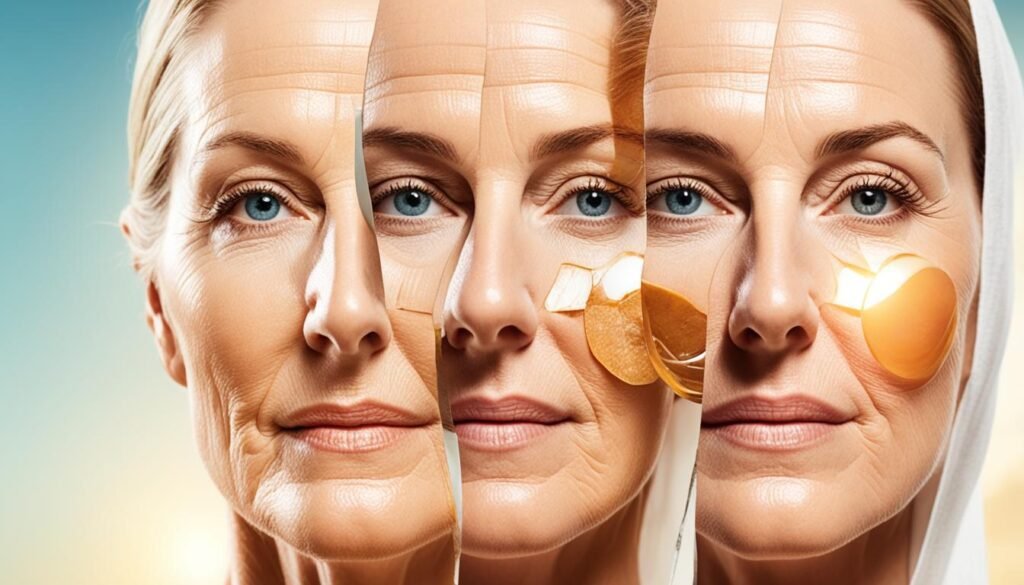
Ultraviolet (UV) radiation from the sun is one of the primary contributors to skin aging. Prolonged sun exposure can lead to wrinkles, age spots, and other signs of premature aging. It is crucial to protect your skin from harmful UV rays to maintain a healthy and youthful complexion.
Wearing sunscreen with a high SPF (sun protection factor) is essential for shielding your skin from the damaging effects of UV radiation. Look for broad-spectrum sunscreens that protect against both UVA and UVB rays. Apply sunscreen generously to all exposed areas of skin, including your face, neck, and hands, even on cloudy days.
Image:
In addition to sunscreen, consider wearing protective clothing, such as wide-brimmed hats, long-sleeved shirts, and sunglasses with UV protection. Seeking shade during peak sun hours, typically between 10 a.m. and 4 p.m., can further reduce your skin’s exposure to harmful UV rays.
“The best sunscreen is a hat and a shirt.” – Gilbert Baker
To prevent sun damage, it’s crucial to incorporate sun protection into your daily skincare routine. Protecting your skin from UV radiation not only helps prevent premature aging but also reduces the risk of skin cancer. Take proactive steps to safeguard your skin and maintain a youthful and healthy appearance.
| Benefits of Sun Protection | Ways to Protect Your Skin |
|---|---|
|
|
Collagen and Skin Aging
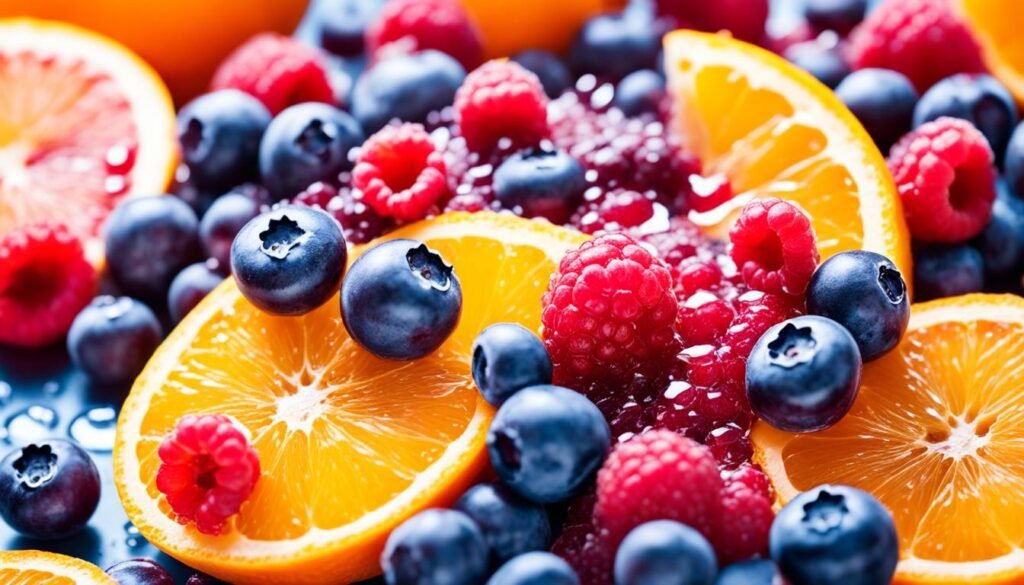
Collagen plays a vital role in maintaining the health and appearance of our skin. It is a protein that provides structure and elasticity, giving our skin a youthful and plump appearance.
As we age, however, collagen production naturally decreases. This decrease leads to a loss of firmness and the formation of wrinkles, fine lines, and sagging skin.
To combat these visible signs of aging, it is important to support collagen production and preserve existing collagen. One way to do this is by consuming a diet rich in antioxidants, vitamins, and minerals.
Eating foods high in antioxidants, such as fruits like berries and citrus, and vegetables like leafy greens and bell peppers, can help protect collagen from damage caused by free radicals and oxidative stress.
Incorporating foods rich in vitamins A, C, and E as well as zinc and copper can also support collagen synthesis.
In addition to a healthy diet, external factors such as UV exposure, smoking, and pollution can accelerate collagen breakdown. To preserve collagen and maintain youthful skin, it is essential to protect our skin from these damaging factors.
Using sunscreen with a high SPF, wearing protective clothing and accessories, and avoiding excessive sun exposure can help prevent collagen degradation caused by UV radiation.
Avoiding smoking and minimizing exposure to environmental pollutants can also contribute to healthier collagen levels.
Preserving collagen is key to maintaining youthful and healthy skin. By nourishing our bodies from the inside with collagen-supporting foods and protecting our skin from external factors, we can help slow down the natural aging process and enjoy a more youthful appearance for longer.
| Foods to Support Collagen Production | Vitamins and Minerals |
|---|---|
| Fruits like citrus, berries, and tropical fruits | Vitamin C |
| Vegetables like broccoli, bell peppers, and leafy greens | Vitamins A and C |
| Fatty fish like salmon and mackerel | Omega-3 fatty acids |
| Nuts and seeds like almonds and flaxseeds | Vitamin E |
| Lean proteins like chicken, turkey, and tofu | Zinc and copper |
Conclusion
In conclusion, adopting an anti-aging diet that incorporates a variety of fruits, vegetables, nuts, seeds, and whole grains is essential for nourishing your body and promoting skin health. By consuming foods that are rich in antioxidants, healthy fats, and essential nutrients, you can provide your skin with the necessary building blocks for a youthful, radiant glow.
Remember to prioritize foods that are high in vitamins, such as broccoli, red bell peppers, and spinach, which support collagen production and protect against oxidative stress. Additionally, incorporating fruits like avocado, blueberries, and papaya into your diet can provide powerful antioxidants that combat free radicals and promote a vibrant complexion.
Furthermore, don’t forget about the importance of nuts, seeds, and whole grains, which offer a range of benefits such as protecting against UV damage, retaining moisture, and stabilizing blood sugar levels. By making these dietary choices, you can address the key factors that contribute to skin aging and maintain a youthful appearance over time.
FAQ
What is an anti-aging diet for skin care?
An anti-aging diet for skin care is a nutrition plan that focuses on consuming foods rich in antioxidants, healthy fats, and essential nutrients. These foods can help nourish the body and promote skin health, reducing the signs of aging.
What are the best vegetables for youthful skin?
Broccoli, red bell peppers, spinach, sweet potatoes, and watercress are some of the best vegetables for youthful skin. They are packed with vitamins, antioxidants, and nutrients that support skin health and provide the building blocks for healthy, radiant skin.
Which fruits are good for radiant skin?
Avocado, blueberries, and papaya are fruits that are good for radiant skin. They are rich in antioxidants, vitamins, and minerals that benefit overall health and promote skin health. These fruits provide essential nutrients for maintaining a glowing complexion and reducing the signs of aging.
What role do nuts and seeds play in skin care?
Nuts and seeds, such as almonds and walnuts, are a good source of vitamin E and healthy fats that help repair skin tissue, retain moisture, and protect against UV damage. Pomegranate seeds are also beneficial for skin health due to their high antioxidant content.
How do power carbs affect skin health?
Power carbs, including whole grains, beans, and lentils, provide a good source of fiber, antioxidants, and protein. These carbohydrates help stabilize blood sugar levels, protect against collagen damage, and promote overall skin health.
What is the impact of sugar on skin aging?
Elevated levels of blood sugar can damage collagen in the skin, leading to a loss of elasticity, wrinkles, and sagging skin. It is important to limit added sugars and refined carbohydrates in the diet to maintain healthy, youthful-looking skin.
How does sun protection affect skin aging?
Ultraviolet (UV) radiation from the sun is a major factor in skin aging. Protecting the skin from sun damage, such as wearing sunscreen and protective clothing, is crucial for maintaining youthful-looking skin and preventing premature aging.
What is the role of collagen in skin aging?
Collagen is a protein that provides structure and elasticity to the skin. As we age, collagen production decreases, leading to sagging and wrinkles. Consuming foods high in antioxidants, vitamins, and minerals can help support collagen production and maintain skin health.
How does an anti-aging diet benefit the skin?
By incorporating an anti-aging diet rich in antioxidants, healthy fats, and essential nutrients, you can nourish your body and promote skin health. Eating a variety of fruits, vegetables, nuts, seeds, and whole grains provides your skin with the nutrients it needs to maintain a youthful, radiant glow.

